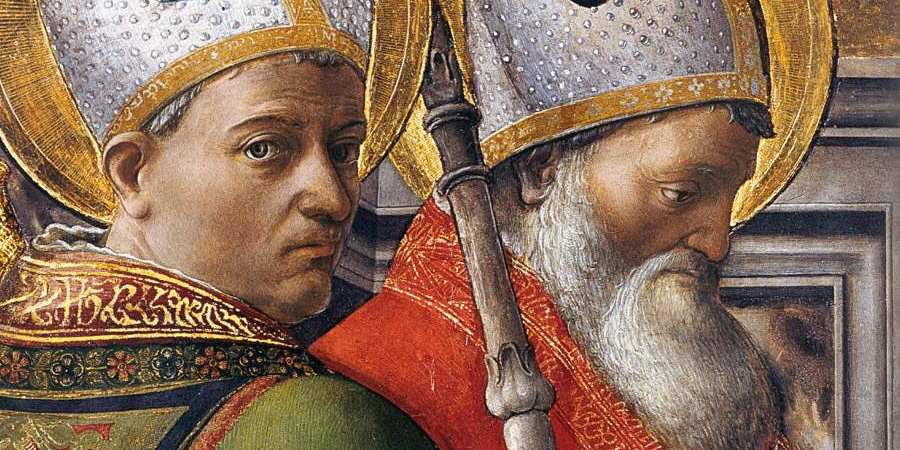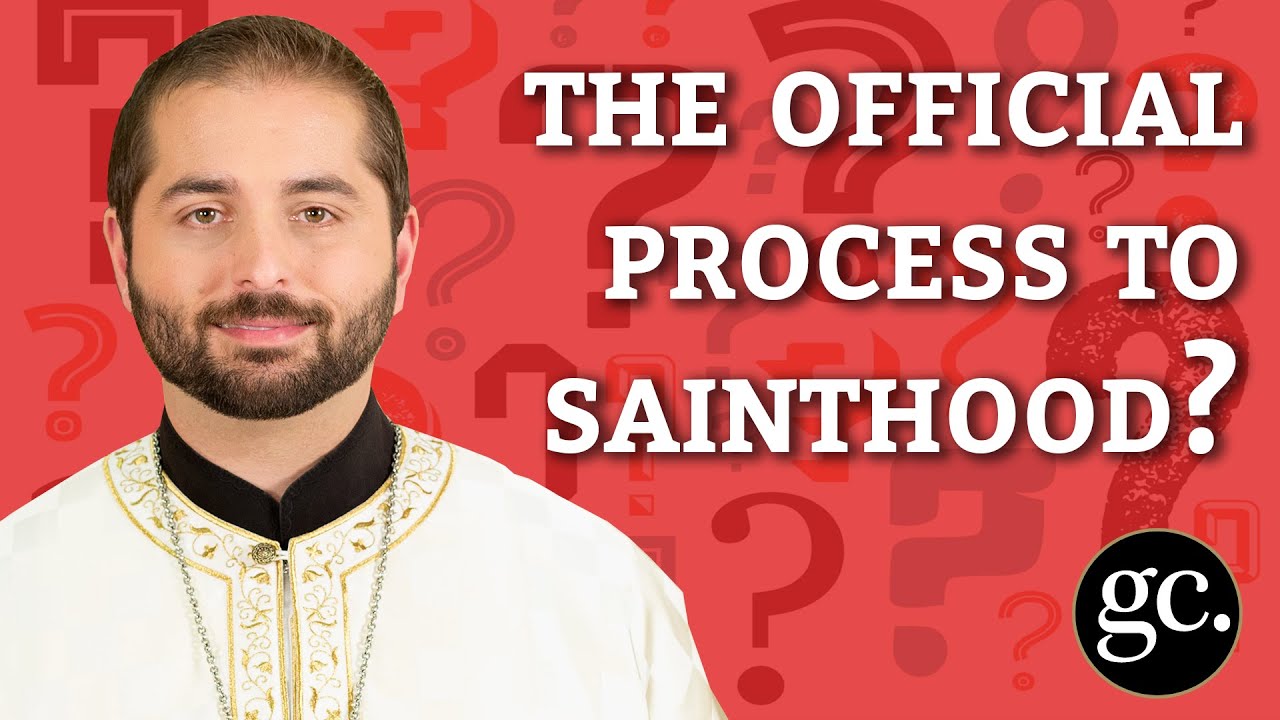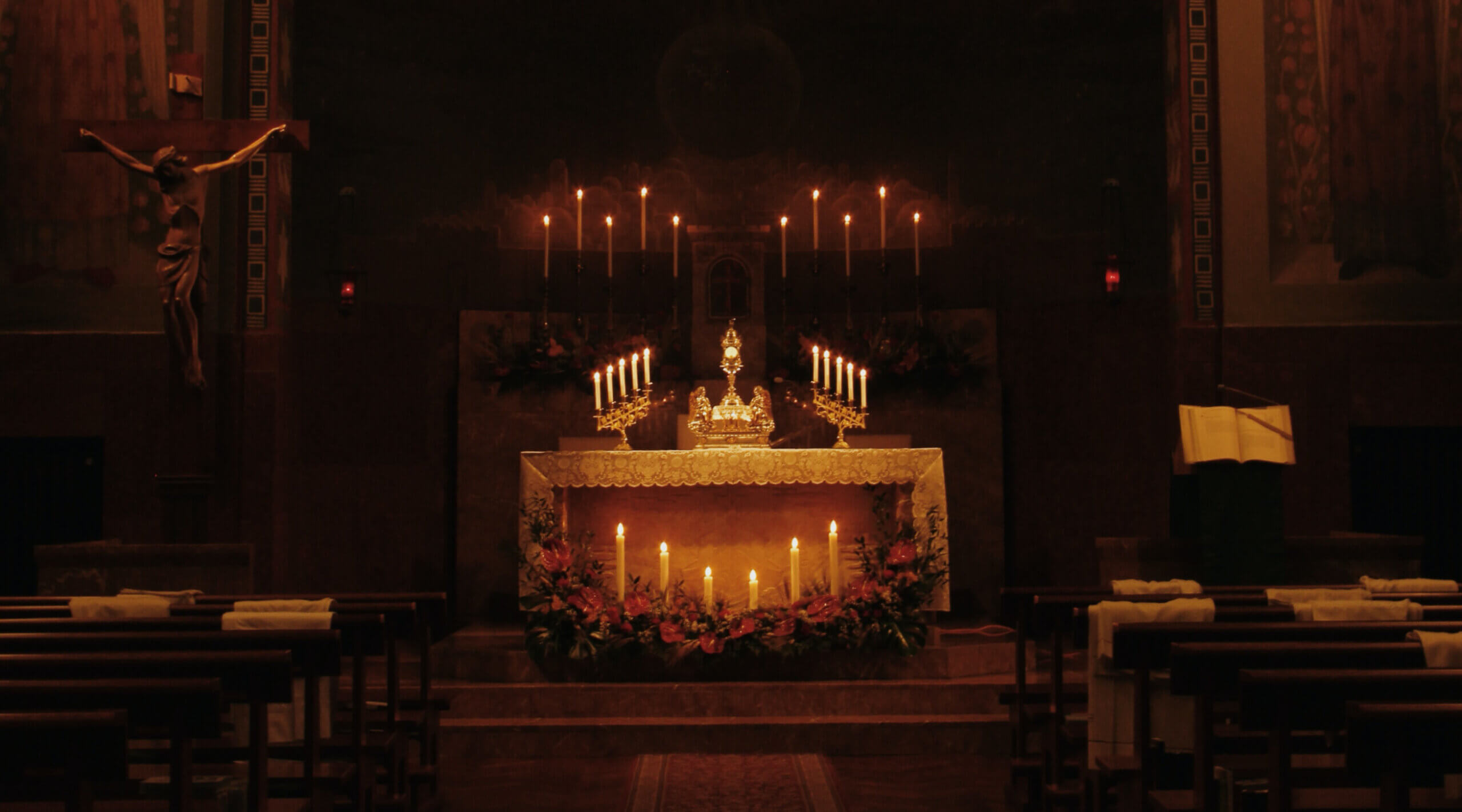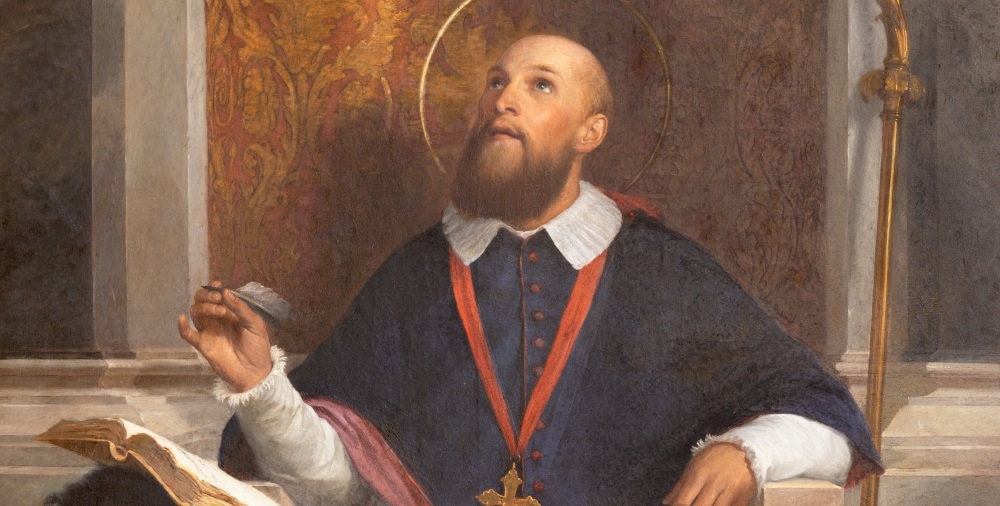
St. Ambrose of Milan occupied lofty positions of authority during tumultuous times. These influential roles brought unusual public consequence and drama to his life.
This influence, however, never went to his head—he became a perfect example of a courageous man: steadfast in his principles, yet charitable and “wise as a serpent, simple as a dove” (Matthew 10:16).
Ambrose increased the faith of Christians and helped to maintain civic peace. He is also famous for being a life-changing witness and mentor to none other than St. Augustine. Augustine’s mother, Monica, had prayed for many years for her son’s conversion—but it was Augustine’s encounters with Ambrose that were his catalyst for grace.
Who Was Ambrose?
St. Ambrose was born around 340 A.D. into a Christian family. His father was an important official in the government of the Roman empire, frequently identified as the Prefect of Gallia (i.e., the governor of modern France, Britain, Spain, and Portugal).
His mother was a devout woman from a prestigious family. Ambrose had two siblings, Satyrus and Marcellina, both of whom are also recognized as saints.
When his father died (Ambrose was about fourteen at the time) the family moved to Rome.
As a young man, Ambrose followed in his father’s footsteps and entered imperial service. In 372, at the age of thirty-two, he was given responsibility for the region around Milan.
This was a fairly prominent position since Milan was, at that time, one of the great regional capitals of the Roman empire. The prominence of the city as an imperial seat made it a center for certain controversies of the day, and Ambrose—by his prominent secular position—was thrust into these controversies.
“Ambrose for Bishop!”
Christianity was becoming increasingly popular in the highest ranks of the Roman officials, though it was not to become the state religion until a few years later.
As it rose in political influence, the Church became torn by the Arian heresy’s denial of the full divinity of Christ. In fact, when Ambrose arrived in Milan in his government capacity, Milan’s bishop was an Arian.
Two years later, this bishop died, and the orthodox and Arian factions of the city’s laity struggled and argued with each other over choosing a successor.
Ambrose, as the secular governor, pleaded for peace and order amid the tumult. Using words of wisdom, he did everything he could to prevent chaos. It had a surprising effect that he did not expect. Both sides of the crowd—impressed with Ambrose’s eloquence and fairness—suddenly began calling for Ambrose himself to be made bishop! “Ambrose for bishop!” they cried out.
Ambrose resisted them. He did not want to become bishop—and felt that he was ill-prepared for such a vocation. Although a lifelong follower of Christ, he was still an unbaptized catechumen.
Ambrose fled, and attempted to hide. It didn’t last long. The family that was hosting him eventually gave away his hiding place. The people insisted that he become their bishop.
He was therefore baptized, ordained a priest, and consecrated a bishop within a week.
Ambrose and the Arians
Two years later, the emperor of Milan died and was succeeded by his young son, whose Arian mother became the effective power in the region. The empress gave new laws severely punishing criticism of or actions opposing Arianism.
In 385, Ambrose was ordered to turn over the use of two churches to the Arians of the imperial court. Execution was a possible punishment for disobedience.
Undeterred, Ambrose refused. Thus began a year-long controversy which put him in personal danger.
He declared:
“If you demand my person, I am ready to submit: carry me to prison or to death, I will not resist; but I will never betray the church of Christ. I will not call upon the people to succour me; I will die at the foot of the altar rather than desert it. The tumult of the people I will not encourage: but God alone can appease it.”
In Lent of 386, the Emperor and Empress ordered Ambrose and the local Arian bishop to choose lay judges who would determine the outcome. If Ambrose refused to choose judges, the Arian would take his seat as Bishop of Milan.
Ambrose still refused. He knew that if he chose Christian lay judges and they upheld their faith by refusing to surrender the churches, they could face severe punishment themselves.
Instead, he went to the basilica and refused to leave. The Christians of Milan joined him, barricading themselves inside the church. They wanted to protect their bishop from violence.
On Palm Sunday, still in the basilica with a crowd of supporting laity and surrounded by opposing soldiers outside, Ambrose preached a sermon addressing the situation.
It was a strong sermon; we can only imagine the fortifying yet calming effect it had on the congregation.
In this homily, he made clear the principles underlying his course of action:
- Steadfast care of his flock. From the very beginning of the sermon, Ambrose assures the gathered laity that he will not abandon them. “Were you afraid that I should desert the Church and forsake you in fear for my own safety? . . . I will never willingly desert you. . . .”
- Respect for the proper authority of the Emperor. At several points Ambrose made clear that he respected the Emperor and only opposed the state’s intrusion on the rights of God. If the state asked for tribute, he said, “I will willingly give up whatever of my own property is demanded, whether it is estates, or house, or gold, or silver — anything, in fact, which is in my power. But I cannot take anything away from the temple of God. . . I am acting for the Emperor’s good, for it would neither be right for me to give it up, nor for him to receive it.” Later he concluded, “the temple of God cannot be Cæsar’s by right.”
- Readiness to suffer for serving Christ. Hearing the soldiers outside the basilica, and preaching only days before Good Friday, Ambrose said to the congregation before him: “Allow, I beg you, your bishop to meet his foes.” He feared for the safety of the crowd, although he did not fear for himself. He had already made plain that he would not use force to resist arrest, despite the unjust punishment he would face: “Christ wills to suffer in His servants.”
Soldiers did not seize Ambrose that day, and eventually the Emperor stopped seeking to take the basilica.
“Throughout the long struggle Ambrose displayed in an eminent degree all the qualities of a great leader. His intrepidity in the moments of personal danger was equalled only by his admirable moderation; for, at certain critical stages of the drama one word from him would have hurled the Empress and her son from their throne. That word was never spoken. An enduring result of this great struggle with despotism was the rapid development during its course of the ecclesiastical chant, of which Ambrose laid the foundation. Unable to overcome the fortitude of the Bishop and the spirit of the people, the court finally desisted from its efforts. Ere long it was forced to call upon Ambrose to exert himself to save the imperilled throne.”
NewAdvent.org
Worthy of Imitation
Ambrose’s acceptance of personal suffering, firm resolve in matters of principle, and level-headed tone allowed him to help bring a peaceful resolution to a dangerous situation.
We should strive to imitate him. We can ask ourselves:
- Are we steadfast in our beliefs?
- Do we recognize proper political authority, but understand when it oversteps its bounds?
- Are we ready to suffer for the Faith and the Church?
St. Ambrose is one of the original Doctors of the Church. His wisdom, fortitude, and charity make him a great saint for our times and for all times.
Sancte Ambrosi, ora pro nobis!
If you want to read St. Ambrose’s famous sermon in its entirety, you can find it in this book: Sermons in Times of Crisis.







